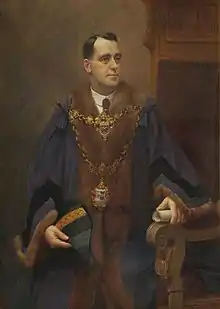Albert Lindsay Parkinson
Sir Albert Lindsay Parkinson (24 February 1870 – 3 February 1936[1][2]), often known as Lindsay Parkinson, was a British businessman and Conservative Party politician. He was the Member of Parliament (MP) for Blackpool in Lancashire from 1918 until 1922.

Biography
Parkinson was born in Lytham to Jacob Parkinson, a joiner. The family moved to Blackpool in 1873. He left school at fourteen to join his father's business, Jacob Parkinson & Co., which later expanded into the building trade. On the death of Jacob in 1902, the business became a limited company, with Lindsay Parkinson as managing director.[3][4]
Parkinson served on Blackpool Town Council from 1905 to 1919, and was elected three times as Mayor of Blackpool, serving from 1916 to 1919.[3][5]
At the 1918 election, he was selected as the Coalition Conservative candidate for the seat of Blackpool. He did not contest the seat in 1922, when it was held for the Conservatives by Leonard Molloy.
Parkinson was appointed Knight Bachelor in the 1922 King's Birthday Honours.[5] He was knighted by King George V at Buckingham Palace on 8 July 1922.[6]
On being knighted, Parkinson changed the name of his company to Sir Lindsay Parkinson & Co. Ltd.[3] On 13 July 1937, it was incorporated as a public company, technically known as Sir Lindsay Parkinson Holdings Limited.
Parkinson remained involved in politics, serving as chairman of the Blackpool Conservative and Unionist Association in 1924.[7] He received the Freedom of the Borough of Blackpool in 1926.[8]
A keen sportsman, Parkinson gave the cricket ground at Stanley Park to Blackpool Cricket Club. He arranged his own cricket eleven, which played two first-class matches, one in 1933 against the touring West Indians, and one in 1935 against Leicestershire, both at Stanley Park.[9]
Parkinson died on 3 February 1936, aged 65, at his home, Royal Bank, Preston Old Road, Marton, where he had lived for many years,[10] and was buried in Marton Cemetery.[3]
References
- Cook, Chris; Jones, Philip; Sinclair, Josephine; Weeks, Jeffrey (1977). Sources in British Political History 1900-1951. Vol. 4. A Guide to the Private Papers of Members of Parliament, L–Z. London: Macmillan Press Ltd. p. 98. ISBN 978-1-349-15764-8.
- "Sir Albert Lindsay Parkinson". Members of Parliament after 1832. History of Parliament Online. Retrieved 20 May 2020.
- "Parkinson, Sir Albert Lindsay". Oxford Dictionary of National Biography (online ed.). Oxford University Press. doi:10.1093/ref:odnb/48091. (Subscription or UK public library membership required.)
- Wood, Allan W.; Bottomley, Chris (2018). A-Z of Blackpool: Places-People-History. Amberley Publishing: Stroud. p. 107. ISBN 978-1-4456-6862-8.
- "No. 32716". The London Gazette (Supplement). 3 June 1922. p. 4319.
- "No. 32730". The London Gazette. 18 July 1922. p. 5354.
- "CHAR 2/132 Public and political: general correspondence". Churchill Archive. Retrieved 20 May 2020.
- "Honorary freeman freedom of the borough and Blackpool Medal". Blackpool Council. 10 June 2019. Retrieved 20 May 2020.
- "First class matches played by Sir L Parkinson's XI". CricketArchive. Retrieved 20 May 2020.
- "Preston Old Road c1910". Lytham and St. Annes on the Sea, Lancashire - Local History. Retrieved 20 May 2020.